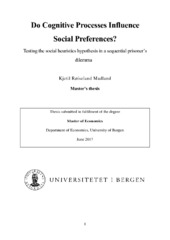Do Cognitive Processes Influence Social Preferences? Testing the social heuristics hypothesis in a sequential prisoner's dilemma
Master thesis
Permanent lenke
https://hdl.handle.net/1956/16098Utgivelsesdato
2017-06-09Metadata
Vis full innførselSamlinger
- Department of Economics [289]
Sammendrag
Is cooperation intuitive or deliberative? From an early notion of cooperation as a deliberate suppression of innate selfish preferences, a growing body of literature has turned the general perception towards prosocial behaviour as something intuitive, sometimes actively oppressed for the sake of selfish needs and wishes. If the dual-process framework from psychology gives a better description of decision making than do the classical economic models, this will have important implications for many economic models. Testing the social heuristics hypothesis through a sequential prisoners’ dilemma conducted both in the lab and by an online survey, I find no conclusive evidence that increased deliberation systematically changes willingness to cooperate with strangers. This is the first study (to my knowledge) to isolate the effect of a manipulation through preferences. The results hold for both a general regression of cooperation on the deliberation treatment, and for the main analysis, with separate effects through preferences and beliefs.
